SUMMARY
This is AI generated summarization, which may have errors. For context, always refer to the full article.
TARLAC, Philippines – I see the clothesline. An outdoor clothesline in the vast contested land up north. There are families here, home to nearly 6,000 peasants. The story a clothesline can tell. Hanging are farmers’ clothes, a lot of long sleeves, cropped pants, sandos, and a few of children’s underpants. The wardrobe of the farmers who work under the sun and their everyday wear washed and dried by the women in their lives.
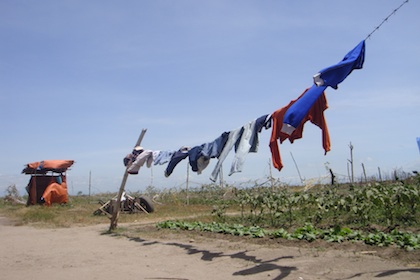
Their wives, mothers, sisters, daughters — women workers always making sure clothes dry fast, ready for next day’s work. The image of the work clothes hanging and the work involved in the daily chore of women, I draw a mental image of a hardworking peasant family. As I look around, nearby is another pile of laundry.
On a Sunday, under the heat, I see two young girls biking. Hurrying to run an errand. Whether it is a Sunday or not, some children are no longer studying. Some families could no longer support their children’s education – children who are not in school are left to help around the house and their land in the meantime.
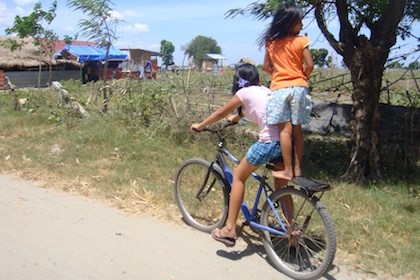
I am sitting when I catch a little boy playing in their giant backyard, turkeys, goats, chicken, hens, chicks and lots of puppies are his playmates. Innocently they run the field, which their great grandparents have been fighting for. They play with joyous laughter and giggles, while their mothers prepare their lunch. The men meanwhile engage visitors about the history of Hacienda Luisita.
The nipa hut is a familiar site. Most of the huts are open, with big long benches to accommodate visitors. I notice it is like a Sunday visit to one’s family with everyone coming to share a meal. I slip out and am curious to see who are behind the huts. Just like what I do when I go visit my Mom’s or grandma’s house and peek at the chaos.
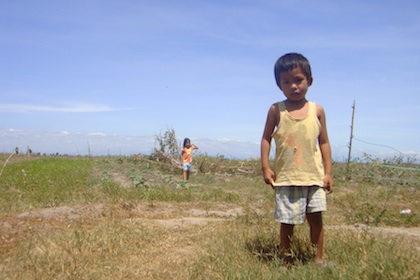
I lead myself to the back of the house. There they are — the women. The women are preparing food, fetching water, cooking in charcoal pots and pans. These women again play a central role in being farmers, food producers, and homemakers. Tending not only to their land, cultivating their crops. But more importantly asserting their rights as owners of the 7,500 hectares. They have not abandoned the multiple roles they play, from advancing in picket lines to home and agriculture.
It is a bright day, you can feel the sun’s rays on your skin and the women do not spend their days or hours unproductive. They have small businesses such as local desserts sold to visitors and the neighborhood — halo-halo, a colorful, ice-cold Filipino favorite. One lady sells selling her halo-halo, unmindful of the difficulty of bringing their kids under the scorching heat because no one else is left to look out for them.
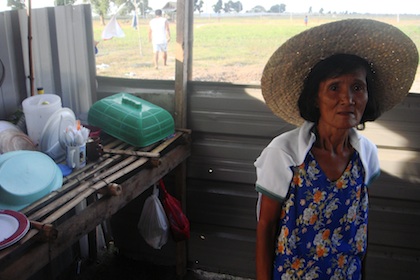
We go around Hacienda Luisita, we were unexpected visitors in the homes of peasant women and men. Yet we were warmly welcomed to their hard earned houses. Built with the strongest foundation, their own blood, sweat and tears. They have worked in sugarcane fields and in the sugar refinery most of their lives but now since they have claimed some of their land – they are able to produce their own crops.
We enter the home of a couple with 5 children, husband and wife share their stories and struggles. Four children didn’t finish school any more after the welga families’ financial capacity to keep them in school has been a challenge and their sentiment how could anyone live with P9.50 only in their pockets after 8 hours of work, 4 times a month? The palay is now their hope. They grow rice and other vegetable produce to sell outside their land. Tilling their own land has become their treasure. Valuable as gold. This is their life, their land and grains. The raw palay glimmers like gold.
These are the grandchildren of the farm. Their parents and grandparents may have faced daunting obstacles to claim their land and they still are struggling but there is nothing more rewarding and meaningful than knowing you are working for what is yours. That you literally will reap what you sow. Again and again, they have insisted no one will grow hungry as long as you work and till your land.
I speak to another woman farmer and her young daughter. She says her daughter is in 5th grade and an honor student. She would like to have a different life for her daughter. Maybe one with less conflict.
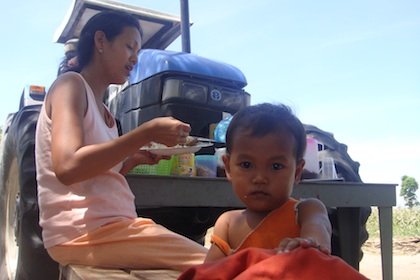
The whole farm on a Sunday is filled with roaming children of all ages. These are the toddlers playing with cats in their homes and curious about their visitors. Seeing the little girls, I can only hope they could be in a better situation. Hopefully they wouldn’t need to give up school.
In the neighborhood, the grandfather lives with all these young mothers and children. He supports them with the land they own and the young women contribute by working on their grandfather’s land to put food on the table. Most are in their early-20s. They have tried finishing school, as their diplomas hanging on the walls of their house attest. I notice this when I peek. And not far away is another cradle with a sleeping baby, besides the brood of kids already at the door.
We leave again before the sun starts to set and walk around till the smell in the air changes. It is a sweet, burnt-like aroma of sugar. We are near the sugar refinery and the truckloads of sugar cane.
The sweet smell and richness of sugar is enticing. It lingers with sweet promises but I couldn’t see it in the eyes of Nanay Maria. She is 75 years old, born with peasant parents, became one and grown old, and entangled in land ownership problems. They fight for the distribution of thousands of hectares and are still struggling like the rest. They don’t want compromises or sweetened deals. They only want what is rightfully theirs to begin with.
The women of Hacienda Luisita have no time for sugar-coated words.
These women must be remembered. As peasant women living alongside peasant men, they suffer the same circumstances but have no direct access to the land. Most of the time they don’t have control and yet they work as hard and continue to support their homes, communities, and their country. They feel extreme pressure and suffer while making sure their families survive. They force many hours of work within and outside the home to provide income, and even give their selfless care to loved ones.
I want to honor these women and their never-ending day-to-day battle. There’s no time to complain. The day is about to end. I take my last shot of two women still at work. The women are watering their vegetables. And as our van pulls away, one woman collects the dried laundry. – Rappler.com
Add a comment
How does this make you feel?
There are no comments yet. Add your comment to start the conversation.